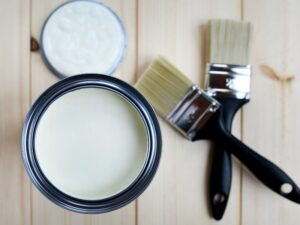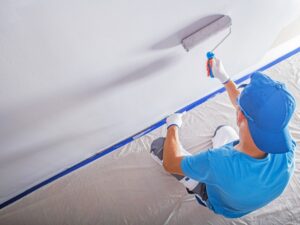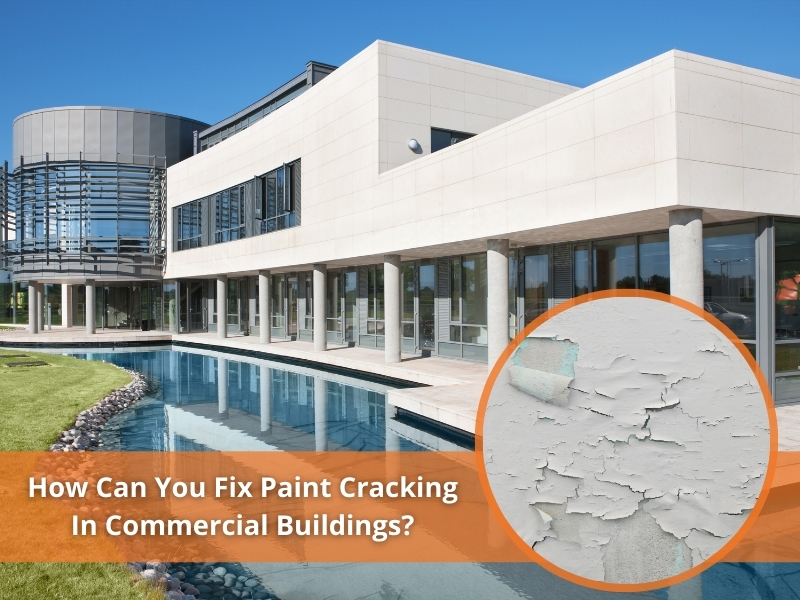Maintaining a fresh, professional appearance is essential when managing a commercial property. One of the most common issues property owners face is paint cracking, which can create an unappealing look and potentially lead to further damage. Understanding the causes, prevention methods, and solutions for paint cracking is crucial.
What causes paint cracking in commercial buildings?
Paint cracking can occur for several reasons, often linked to poor application, environmental factors, or the quality of the materials used. Here are the primary causes:
- Improper surface preparation: If surfaces aren’t cleaned or appropriately primed before painting, the paint won’t adhere correctly, leading to cracks over time.
- Moisture and humidity: Excess moisture from water leaks or high humidity can cause paint to bubble and crack, especially in bathrooms, kitchens, or near plumbing areas.
- Temperature fluctuations: Extreme heat or cold can cause the paint to expand and contract, leading to cracking.
- Age of paint: Paint naturally degrades over time, especially if it’s exposed to heavy traffic or harsh elements.
- Low-quality paint: Using cheap, low-quality paints can result in poor durability and cracking, particularly in high-traffic commercial areas.
How can you prevent paint cracking before it happens?
Prevention is always better than dealing with the issue after it arises. Here are several ways to minimise the chances of paint cracking in your commercial space:
- Proper surface preparation: Clean and sand the surface before painting to ensure better adhesion. Always apply a high-quality primer.
- Use high-quality paints: Invest in durable, high-quality paints designed for commercial use. These paints are more resistant to cracking and fading.
- Ensure proper ventilation: Adequate airflow in the building can prevent excessive moisture, which is a common cause of cracking.
- Seal cracks before painting: Any pre-existing cracks should be sealed with filler before applying the paint.
- Choose the right paint finish: To prevent premature wear in high-traffic areas, opt for more durable finishes, such as satin or semi-gloss.
Should you consider repainting or just touching up cracked paint?
When dealing with cracked paint, you may be wondering if you need a full repaint or just a touch-up. Here are some things to consider:
- The extent of damage: If the cracking is extensive or the underlying surface is compromised, a full repaint may be necessary to restore the appearance and protect the surface.
- Type of surface: Smooth, flat surfaces may only require a touch-up, but textured surfaces might need more thorough attention to ensure an even finish.
- Timeframe: Touching up might be sufficient if the paint is relatively new and the cracks are minor, but if the paint is old or the cracks are widespread, a full repaint will be a better solution.
- Cost efficiency: A full repaint can be more expensive upfront, but it provides longer-lasting protection and reduces the need for frequent touch-ups.
What are the best paint options to prevent cracking in commercial buildings?

Not all paints are created equal. To avoid cracking, opt for these high-quality paint options:
- Acrylic latex paint: Known for its flexibility and durability, acrylic latex is ideal for both interior and exterior commercial spaces.
- Elastomeric paint: This highly flexible paint expands and contracts with temperature changes, preventing cracking in areas subject to harsh conditions.
- Epoxy paint: Excellent for areas subject to heavy foot traffic or machinery, epoxy paint is durable and resistant to cracking, making it ideal for industrial or commercial settings.
- Polyurethane paint: Known for its resistance to wear and tear, polyurethane paint is often used in high-traffic areas and provides a smooth, crack-resistant finish.
- Eco-Friendly paints: Low-VOC or VOC-free paints are an excellent choice for Sydney businesses focused on sustainability. These paints are also safer for indoor use, particularly in areas with high occupancy.
To enhance the ambience of your commercial space, consider using paint to brighten up dark spaces and use light and reflective colours to create a more inviting and open environment.
Why is regular maintenance essential for preventing paint cracking?
Regular maintenance is key to preventing paint cracking in the first place. Here’s why:
- Early detection of issues: Regular inspections allow you to spot early signs of paint cracking, moisture damage, or structural issues before they worsen.
- Timely repairs: Touching up small cracks and chips early can prevent them from spreading, saving you money in the long run.
- Extended lifespan of paint: Routine maintenance ensures your paint job lasts longer, maintaining the aesthetic appeal and structural integrity of your commercial building.
- Cost efficiency: Preventing significant damage reduces the need for expensive repainting or repairs down the track.
How can professional painters address cracking paint issues?
Hiring professionals to deal with paint cracking ensures that the job is done correctly. Here’s how experienced commercial painters can help:
- Thorough inspection: Professionals will assess the extent of the damage, including underlying issues such as moisture problems or structural defects.
- Surface preparation: Our expert painters in Sydney will ensure surfaces are properly prepared before any painting is done, eliminating issues with adhesion.
- High-quality materials: They use premium paints that are designed to withstand the wear and tear of commercial spaces.
- Correct application: To achieve the best results, professional painters also use the best paint techniques for walls, such as layering and smoothing.
- Long-term solutions: Rather than just covering up the cracks, they’ll address the root cause to ensure the issue doesn’t reoccur.
How can you benefit from expert commercial painting services?
Professional commercial painting services offer several benefits:
- Expertise: Skilled painters know how to handle different surfaces, weather conditions, and types of paint to achieve the best results.
- Time-saving: Professional painters work efficiently, completing projects on time without compromising quality.
- Cost-effectiveness: By getting the job done right the first time, you avoid costly repairs and touch-ups in the future.
- Minimal disruption: Experienced painters work around your business hours, ensuring minimal disruption to your operations.

What should you know about paint safety in commercial spaces?
When dealing with commercial painting, safety is a top priority. Here’s what you need to consider:
- Lead paint: If your building was constructed before 1970, it may have lead-based paint. Professional painters will handle this with the necessary precautions.
- Ventilation: Proper ventilation in commercial buildings ensures that fumes from paints, especially those with high VOCs, don’t affect the health of your staff or customers.
- Fire safety: In some commercial buildings, fire-rated paints are required to meet fire safety standards.
- Eco-friendly options: Opting for low-VOC or no-VOC paints helps reduce environmental impact and ensures a safer working environment for all.
Get your commercial space looking its best
If you’re dealing with cracked paint on your commercial property, don’t wait until it worsens. Get in touch with Sydney Paintmasters today for expert advice and professional painting services that will restore your space. Whether you need repairs, a full repaint, or maintenance, we have the skills and experience to deliver outstanding results.

